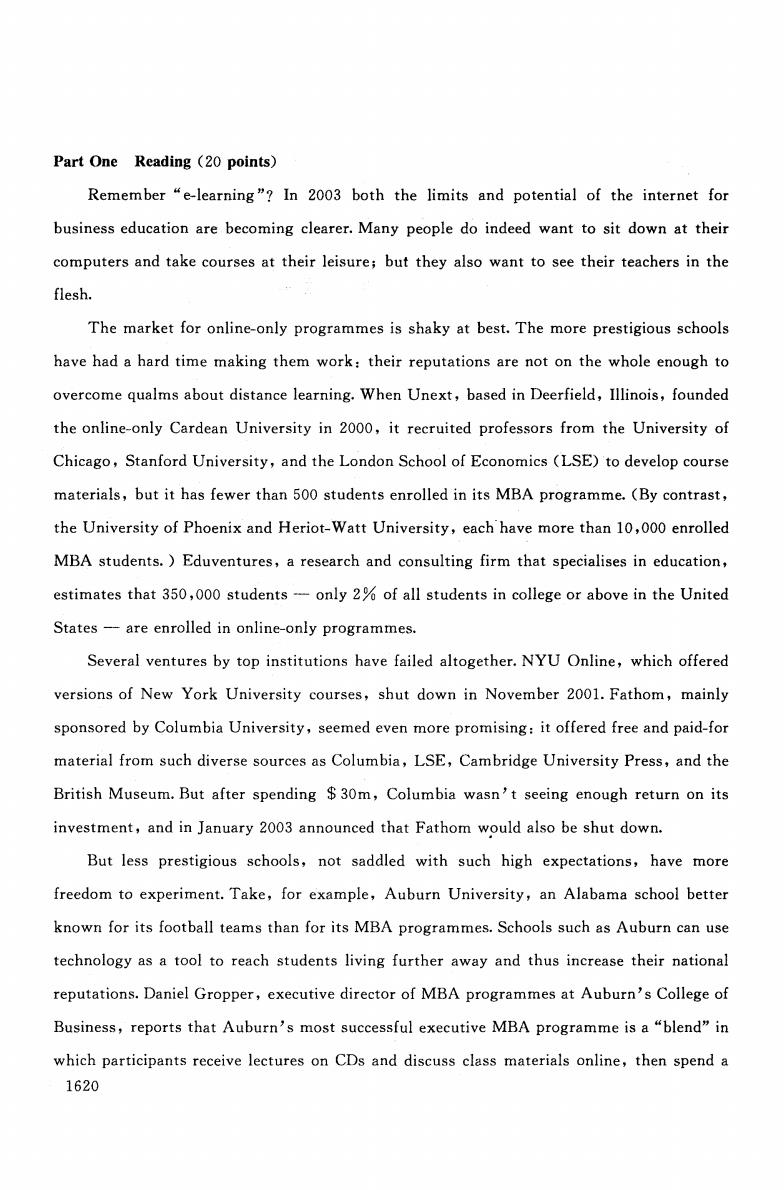正在加载图片...

Part One Reading(20 points) Remember "e-learning"?In 2003 both the limits and potential of the internet for business education are becoming clearer.Many people do indeed want to sit down at their computers and take courses at their leisure;but they also want to see their teachers in the flesh. The market for online-only programmes is shaky at best.The more prestigious schools have had a hard time making them work:their reputations are not on the whole enough to overcome qualms about distance learning.When Unext,based in Deerfield,Illinois,founded the online-only Cardean University in 2000,it recruited professors from the University of Chicago,Stanford University,and the London School of Economics (LSE)to develop course materials,but it has fewer than 500 students enrolled in its MBA programme.(By contrast, the University of Phoenix and Heriot-Watt University,each have more than 10,000 enrolled MBA students.)Eduventures,a research and consulting firm that specialises in education, estimates that 350,000 students-only 2%of all students in college or above in the United States-are enrolled in online-only programmes. Several ventures by top institutions have failed altogether.NYU Online,which offered versions of New York University courses,shut down in November 2001.Fathom,mainly sponsored by Columbia University,seemed even more promising:it offered free and paid-for material from such diverse sources as Columbia,LSE,Cambridge University Press,and the British Museum.But after spending 30m,Columbia wasn't seeing enough return on its investment,and in January 2003 announced that Fathom would also be shut down. But less prestigious schools,not saddled with such high expectations,have more freedom to experiment.Take,for example,Auburn University,an Alabama school better known for its football teams than for its MBA programmes.Schools such as Auburn can use technology as a tool to reach students living further away and thus increase their national reputations.Daniel Gropper,executive director of MBA programmes at Auburn's College of Business,reports that Auburn's most successful executive MBA programme is a "blend"in which participants receive lectures on CDs and discuss class materials online,then spend a 1620Part One Reading (20 points) Remember "e-learning "? In 2003 both the limits and potential of the internet for business education are becoming clearer. Many people do indeed want to sit down at their computers and take courses at their leisure; but they also want to see their teachers in the flesh. The market for online-only programmes is shaky at best. The more prestigious schools have had a hard time making them work: their reputations are not on the whole enough to overcome qualms about distance learning. When Unext , based in Deerfield , Illinois, founded the online-only Cardean University in 2000 , it recruited professors from the University of Chicago , Stanford University , and the London School of Economics (LSE) to develop course materials, but it has fewer than 500 students enrolled in its MBA programme. (By contrast , the University of Phoenix and Heriot-Watt University , each have more than 10 ,000 enrolled MBA students. ) Eduventures, a research and consulting firm that specialises in education , estimates that 350 ,000 students only 2% of all students in college or above in the United States - are enrolled in online-only programmes. Several ventures by top institutions have failed altogether. NYU Online , which offered versions of New York University courses, shut down in November 2001. Fathom. mainly sponsored by Columbia University , seemed even more promising: it offered free and paid-for material from such diverse sources as Columbia. LSE , Cambridge University Press. and the British Museum. But after spending $ 30m , Columbia wasn' t seeing enough return on its investment. and in January 2003 announced that Fathom wpuld also be shut down. But less prestigious schools, not saddled with such high expectations, have more freedom to experiment. Take , for example , Auburn University , an Alabama school better known for its football teams than for its MBA programmes. Schools such as Auburn can use technology as a tool to reach students living further away and thus increase their national reputations. Daniel Gropper, executive director of MBA programmes at Auburn's College of Business, reports that Auburn's most successful executive MBA programme is a "blend" in which participants receive lectures on CDs and discuss class materials online. then spend a 1620